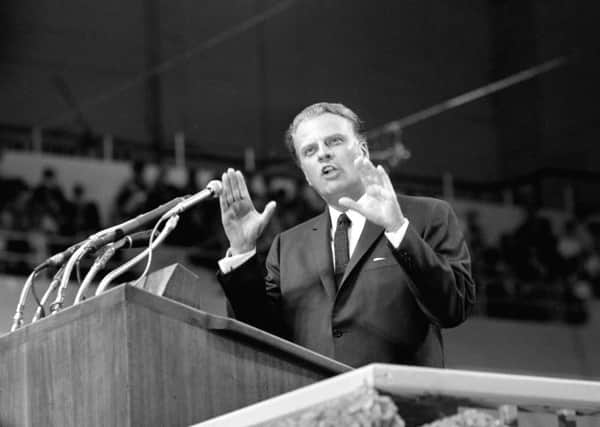The night Billy Graham played at Sheffield's Bramall Lane


Billy Graham, the evangelist who preached to presidents, had brought his roadshow finally to Yorkshire. With a football pitch for a pulpit, he beckoned his flock to come forward and commit themselves to Christ. More than 26,000 did.
“May God help you to make that commitment tonight with these many people that are coming here in Yorkshire, Sheffield, England,” he implored an extended audience on TV.
Advertisement
Hide AdAdvertisement
Hide AdHis death yesterday, eight months short of his 100th birthday, brought to a close perhaps the most remarkable chapter of organised Christianity in the 20th century.
Graham had been suffering from cancer, pneumonia and other illnesses, and died at his home in North Carolina.
He was a veteran of more than a dozen British crusades, and hundreds around the world, when he arrived in Sheffield on June 22, 1985 for a week-long engagement. Cliff Richard came to hear him, not for the first time, and so did the Bishop of Sheffield. Richard sang to the crowd and acceded to the Bishop’s request to renounce his links to a still-divided South Africa.
The Bramall Lane grass was ringed by people in wheelchairs. Some 50 others had to be placed by the St John Ambulance Brigade in one, as hysteria took hold.
Advertisement
Hide AdAdvertisement
Hide AdSuch circuses were familiar to his disciples. His first in Britain had been in London, in the spring of 1954. His 12-week campaign defied expectations, drawing more than two million people. The Queen reportedly invited him to Buckingham Palace for tea and private counselling.
By that time he had been on the road across the US for seven years. His practice was to rent a stadium, park, or street, and to preach to thousands at a time.
His global audience, through his pioneering use of TV and radio, extended to more than 200 million, and unlike traditional evangelists, he abandoned narrow fundamentalism and engaged broader society, turning evangelicalism into a force that rivalled liberal Protestantism and Roman Catholicism in the US.
They called him America’s pastor, and he was a confidant to presidents from Dwight Eisenhower to George W Bush.
Advertisement
Hide AdAdvertisement
Hide AdIn 1983, Ronald Reagan gave him the Presidential Medal of Freedom, America’s highest civilian honour. When the Billy Graham Museum and Library was dedicated in 2007 in Charlotte, North Carolina, former presidents George HW Bush, Jimmy Carter and Bill Clinton attended.
But one president, Richard Nixon, was his Achilles heel. Graham looked the other way during the Watergate scandal, and when, three decades later, tapes were released of conversations the two had held at the White House, they were littered with offensive comments. Graham apologised.
Racism was not in his nature, and in the segregated American south, he had refused to “preach Jim Crow,” as he put it, and – though he was criticised for being “too moderate” on the issue – made several “visits of racial conciliation” to the southern states, at the height of America’s civil rights era.
By his final crusade in 2005 in New York City, he had preached in person to more than 210 million people worldwide. No evangelist is expected to have his level of influence again.
Advertisement
Hide AdAdvertisement
Hide AdIt had been a 1949 Los Angeles revival that turned Mr Graham into evangelism’s rising star. Held in a tent they called the Canvas Cathedral, he had been drawing adequate, but not spectacular crowds until reporters and photographers descended without warning, apparently on the instructions of the publisher William Randolph Hearst. The publicity gave him a national profile, and over the next decade, his crusades made him an international celebrity.
The Archbishop of York has joined the chorus of tributes.
Dr John Sentamu, who had met Graham in Kenya in the early 1970s, spoke of the “new life” that had come to the churches through his missions.
“So often throughout my life I have worked alongside those who have shared with me that their journey of faith in Christ began after hearing Billy Graham preach of the love of God for us sinners, and of Jesus’ power to change lives,” Dr Sentamu said.
The Archbishop added that Graham, whom he said had been “initially ambivalent” about the civil rights movement, had become a friend of Dr Martin Luther King and “came to understand through his reading of the Bible that the Gospel embraced all people without distinction”.
Advertisement
Hide AdAdvertisement
Hide AdHe added: “Wherever people remember Billy Graham today, there will be gratitude.”
An an example to Christians, Graham had “few equals”, the Archbishop of Canterbury said.
The Most Rev Justin Welby said the church owed Graham an “immeasurable” debt.
He said: “Dr Billy Graham stood as an exemplar to generation upon generation of modern Christians.
Advertisement
Hide AdAdvertisement
Hide Ad“When it comes to a living and lasting influence upon the worldwide church he can have few equals: for he introduced person after person to Jesus Christ.
“There are countless numbers who began their journey of faith because of Dr Graham. The debt owed by the global church to him is immeasurable and inexpressible.
“Personally I am profoundly grateful to God for the life and ministry of this good and faithful servant of the gospel. By his example he challenged all Christians to imitate how he lived and what he did.
“He was one who met presidents and preachers, monarchs and musicians, the poor and the rich, the young and the old, face to face.”